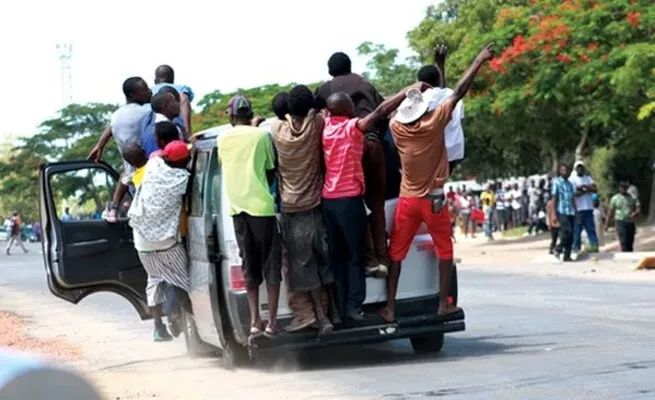By Fanuel Chinowaita
Mutare, Zimbabwe – The Zimbabwe Republic Police (ZRP) has issued a strong warning against touts and illegal rank marshals terrorizing passengers at Mutare’s bus ranks, following continued reports of violence and harassment.
In a statement released on February 7, 2025, police condemned the growing lawlessness, blaming bus operators for fueling the chaos by hiring criminals to control loading bays.
“Transport operators must stop hiring these criminals who intimidate commuters, cause congestion, and hijack routes. We are intensifying operations to restore order, and offenders will be arrested and prosecuted,” the police statement read.
Despite previous crackdowns, touts continue to rule Harare-Mutare Old Rank and Mudzviti Rank, where passengers face daily intimidation.
Many commuters have reported being forcibly loaded onto buses, with some even having their luggage confiscated for refusing to comply. A Mutare resident, Tendai Zunguza, described his harrowing experience at Mudzviti Rank.
“I was heading to Harare, but touts grabbed my bag and forced me onto a Mupfumi bus. When I protested, they insulted me and threatened to beat me. I had no choice but to board,” he said.
Women have also been particularly vulnerable to harassment. Rudo Mandebvu, a commuter, shared how touts cornered her when she tried to board an Inter-Africa bus.
“They told me I couldn’t board that bus and tried to drag me to another one. When I resisted, they started shouting at me, calling me names. It was terrifying,” she recounted.
The chaos at the ranks is linked to an ongoing turf war between rival transport moguls, Isau Mupfumi, a ZANU PF-linked businessman, and Leonard Mukumba, owner of Inter-Africa Bus Services. Their battle over loading bays has escalated into violent confrontations, with passengers caught in the crossfire.
In May 2024, the conflict turned bloody when Farai Chitsa, a senior aide to Mupfumi, was assaulted by suspected rival marshals. Retaliation was swift, as gangs armed with machetes, iron bars, and stones stormed the bus ranks, attacking passengers and rival operators. A witness, Blessing Chigodora, described the scene.
“It was like a war zone. People were running in all directions, screaming for help. The police had to fire warning shots to control the situation,” he said.
Authorities later arrested 22 suspects, including Mupfumi himself, and seized weapons and getaway vehicles used in the violence. However, despite the serious charges, Mupfumi was controversially granted bail in May 2024 to seek medical treatment in Dubai. His marshals remained behind bars, fueling public anger over what many saw as selective justice.
Meanwhile, police launched a manhunt for Leonard Mukumba, who was accused of orchestrating attacks on Mupfumi’s marshals. However, sources suggest that Mukumba managed to flee Zimbabwe, evading arrest.
Although the police have vowed action, commuters remain skeptical. In 2024, Operation “No To Touts” led to the arrest of 677 touts and 1,570 pirate taxi (mushikashika) operators nationwide, yet the violence and intimidation persist. ZRP spokesperson Assistant Commissioner Paul Nyathi admitted the challenges in eradicating touts.
“We have arrested many touts, but they keep coming back because transport operators continue hiring them. We will increase operations, and we urge the public to report these criminals,” Nyathi said.
However, residents argue that arrests alone are not enough. Lovemore Mugweni, a frustrated commuter, dismissed the latest police statement as meaningless.
“We hear these promises all the time, but nothing changes. The touts are back the next day, laughing at the police,” he said.
The continued chaos at the bus ranks is largely driven by political protection, economic hardship, and a culture of violence. Figures like Mupfumi enjoy political connections that allow them to evade accountability, making it difficult for law enforcement to act decisively. At the same time, the transport industry has become oversaturated, leaving operators struggling for passengers and relying on touts to aggressively market their services. This environment has normalized intimidation and violent clashes, with bus operators treating physical confrontations as a business strategy rather than a crime.
To restore sanity at bus ranks, stakeholders are calling for urgent and lasting interventions. The Zimbabwe Passengers Transport Organisation (ZIPTO) has urged authorities to enforce stricter regulations on bus permits to prevent oversaturation and competition-driven violence. Others have proposed the installation of CCTV cameras at bus ranks and GPS tracking systems on buses to monitor unauthorized activity.
Commuters are also advocating for a dedicated hotline where they can report harassment by touts and transport operators, ensuring that perpetrators face swift consequences. Zodwa Muringani, a Mutare resident, emphasized the need for immediate change.
“We just want to travel in peace. The government must take this issue seriously before someone gets killed,” she said.
While the police’s renewed commitment to tackling tout-related violence offers a glimmer of hope, many commuters remain wary. Until authorities take firm action, Mutare’s bus ranks will continue to be ruled by lawlessness, with passengers bearing the brunt of a crisis that shows no signs of ending.

